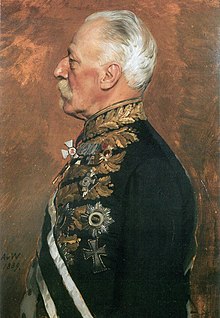Friedrich Krüger (diplomat)
| Friedrich Krüger | |
|---|---|
 |
|
| Born | 22 September 1819 Lübeck |
| Died | 17 January 1896 Berlin |
| Nationality |
|
| Occupation | Lawyer Diplomat |
| Political party | Nonpartisan |
| Spouse(s) | Elisabeth Donnenberg (1831–1889) |
Daniel Christian Friedrich Krüger was a diplomat in the service of the city state of Lübeck and also jointly of the Hanseatic cities of Lübeck, Hamburg and Bremen. He was born in Lübeck on 22 September 1819 and died in Berlin on 17 January 1896.
Krüger was the son of a Lübeck Senator. After attending the Lübeck Gymnasium, he studied jurisprudence at the universities of Bonn, Berlin, and Göttingen and completed his professional training by a long stay abroad, particularly Paris.
In 1844, Krüger became a lawyer in Lübeck and was appointed procurator in the lower court and the court of appeals. Krüger's efficiency was fully acknowledged and in 1850 the city sent him as its representative to the Erfurt Union and the following year to the Elbe Ship Navigation commission in Magdeburg. After the introduction of the new constitution of Lübeck in 1849, he became the Spokesman of the Bürgerausschuss, the Committee of the House of Burgesses.
In 1855 he became the Minister-Resident of the Hanseatic states at Copenhagen and conducted negotiations which resulted in the abolition of the Sound Dues, which had been a tax on Lübeck’s trade out from the Baltic to the open sea. By the Copenhagen Convention in 1857 this source of revenue for Denmark was bought out by Great Britain, Russia, Lübeck and the other states trading in the Baltic.
The railway connections between the three Hanseatic city states were of special interest to him. At his instigation, Denmark agreed to a direct railway line across its territory in Holstein from Lübeck to Hamburg. Already in Copenhagen, he had successfully represented Hamburg's interest in the construction of a railway connecting this town to Altona (in Holstein) and concluded an agreement with the Danish government in 1860.
The Second Schleswig War of 1864 brought an end to Krüger's activity in Copenhagen. He then took over the representation of the free cities in the Bundestag of the German Confederation at Frankfurt. On 14 June 1866 he addressed its last session, before the outbreak the Austro-Prussian War which ended that institution.
...
Wikipedia
